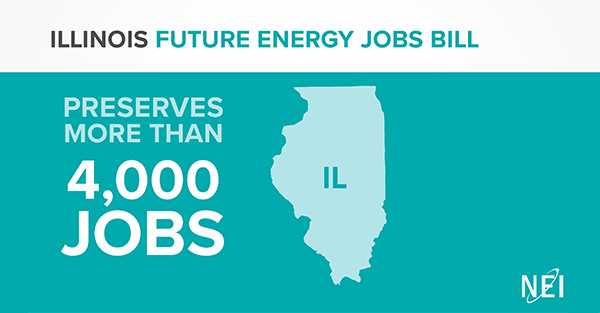Here in a Washington that's preoccupied with political spectacle, it can be easy to miss important details about the business of government that really matter. One of those is coming up next week when the Federal Energy Regulatory Commission (FERC) holds a two-day technical conference about electricity markets in the Northeastern U.S.
Since policymakers in Washington have not been able to find consensus on a comprehensive energy policy for the country, states have shown leadership in trying to ensure that the electricity system of the future will meet their needs. For some time, state governments have adopted renewable portfolio standards (RPS) to spur the growth of wind and solar to meet environmental policy goals. More recently, states like Illinois and New York have enacted similar programs to preserve nuclear power plants, in order to support nuclear energy's unique package of grid stability, zero emissions and fuel supply diversity.
Of particular interest to us are the programs in New York and Illinois that have valued nuclear plants in those states for avoiding emissions. From where we sit, it seems clear that state programs like an RPS or these more recent Clean Energy Standards programs that include nuclear energy are all pursuing the same broad goal of environmental protection. In terms of policy intent, they aren't really different at all, and if you support one, it would be counter-productive not to support them all.
The above is a post from Matt Crozat, senior director of business policy at NEI.
Since policymakers in Washington have not been able to find consensus on a comprehensive energy policy for the country, states have shown leadership in trying to ensure that the electricity system of the future will meet their needs. For some time, state governments have adopted renewable portfolio standards (RPS) to spur the growth of wind and solar to meet environmental policy goals. More recently, states like Illinois and New York have enacted similar programs to preserve nuclear power plants, in order to support nuclear energy's unique package of grid stability, zero emissions and fuel supply diversity.
How these state policies are implemented can be complicated as many states participate in competitive electricity markets that are intended to figure out which power plants should run to maintain reliability at a reasonable cost. This conference will help FERC explore the best ways for markets to work in concert with state policies to achieve broader goals. Next week, when all of the stakeholders get together in Washington, the folks at FERC will be listening intently in order to be able to chart a sensible path forward.
Of particular interest to us are the programs in New York and Illinois that have valued nuclear plants in those states for avoiding emissions. From where we sit, it seems clear that state programs like an RPS or these more recent Clean Energy Standards programs that include nuclear energy are all pursuing the same broad goal of environmental protection. In terms of policy intent, they aren't really different at all, and if you support one, it would be counter-productive not to support them all.
So why is this so important now? When the electric markets were established in this area of the country, grid operators had spent decades planning and making wise investments in order to support both reasonable prices for customers as well as reliable service. Supporting that was a commitment to diversity of fuel supply that kept the lights on and prices stable.
What's changed is that the arrival of cheap natural gas has forced prices so low that the diversity of supply we've taken for granted is under threat. And when it comes to natural gas, history has told us that what might look like a glut today can evolve into a frightening shortage tomorrow. It's up to staff and leadership at FERC to take a longer-term view and make prudent decisions today to hedge against inevitable risks tomorrow. We'll be paying close attention to the conversation next week and in the months to follow. You should too.
The above is a post from Matt Crozat, senior director of business policy at NEI.



Comments